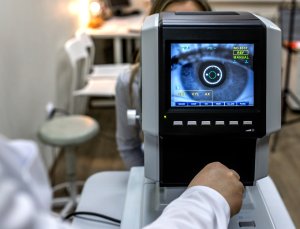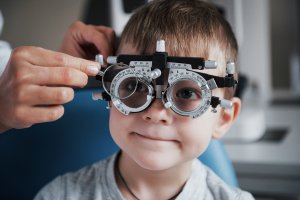Cataract Surgery Hazleton PA

Voted Best of Berks—
eight years in a row!
If you live or work in Hazleton PA and have considered cataract surgery, Eye Consultants of Pennsylvania can become your eye care specialist. Most patients wonder whether they are a candidate for cataract surgery, so we want to share a case study with you that is very typical of the new patients who come to see us.
A typical patient
Many of our patients are age 65 to 70 when they first notice signs of a cataract, such as cloudy or blurred vision or difficulty with night driving. Recently, we had a 69-year-old male as a new patient. He has diabetes and takes metformin. He is also on medication for high blood pressure. He had noticed decreased vision in his left eye, gradually, over time. Note that cataracts can occur in one or both eyes.
The patient had no history of other eye diseases like glaucoma or macular degeneration. We determined that he was a candidate for cataract surgery, even with his health complications. He had both myopia and presbyopia vision issues, which we were able to correct by implanting a corrective lens. During cataract surgery, we removed the old clouded natural lens and replaced it with an intraocular lens implant, which can be clear or can have vision correction built into the lens. These days, we have a wide variety of lens technology to correct a plethora of vision issues.
We sent him home with some eye drops to prevent infection. He had a bit of discomfort for a couple of days, but on his return checkup appointment 48 hours later, he was healing nicely.
Does this sound like you?
We hope this patient’s experience resonates with you. As a person ages, cataracts form as a natural part of that aging process. Proteins in the eye naturally break down with age and cause the cataract. In the early stages, there are typically no apparent signs, but as the cataract grows and deposits on the lens, patients begin noticing the signs.
Because a cataract can grow for years without a person knowing they have one, regular eye exams are the only way to detect cataracts. Regular visits with our experienced professionals will allow us to track your cataract’s progression.
Once cataracts start progressing, our patients usually notice cloudy or blurry vision. Many describe it as if they are looking through a waterfall. Many patients also experience increased light sensitivity in bright indoor light or sunlight. Driving at night can be difficult because halos and glare form around street lights and oncoming headlights. Many of our patients say their cataract symptoms are particularly noticeable at night. Furthermore, nighttime vision does gradually worsen as the cataract formation grows.
Have you had any of these signs? How long has it been since you had an eye exam? Remember that regular eye exams from a trusted provider like Eye Consultants of Pennsylvania are key for adults over the age of 60. If you indeed have cataracts, we will monitor the progression. Surgery may not be necessary right away, but when it is time for cataract surgery and you’re in Hazleton PA, our excellent Pottsville team will be ready for you.
Find a Doctor
Physician information including education, training, practice location and more.
Schedule an Appointment
Call 800-762-7132 or make an appointment online.





